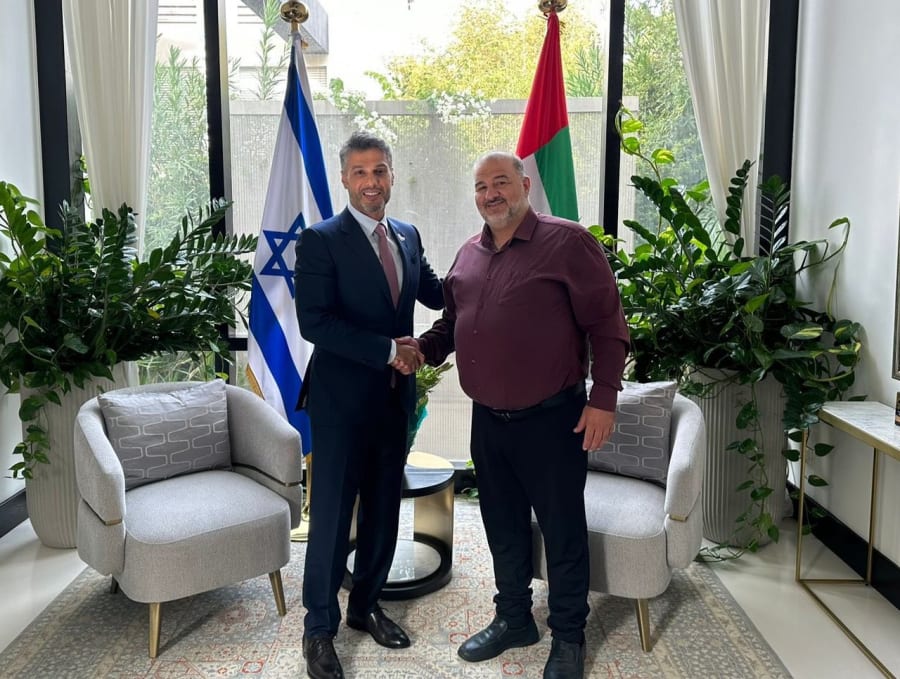Is UAE looking to strengthen connection with the Jewish state by investing in Israeli-Arab community?

The United Arab Emirates embassy in Israel announced on Tuesday that its ambassador, Mohamed Al Khaja, had met with the Arab-Israeli Knesset Member Mansour Abbas concerning potentially increased cooperation between the UAE and the Arab-Israeli community, numbering around 20% of Israel's total population.
“A pleasure hosting my good friend (Mansour Abbas) today. Thank you for highlighting potential projects and important areas for cooperation in the fields of culture, education, business, and sports in Israeli-Arab towns and cities across the country,” read the official statement from the UAE embassy in Tel Aviv.
The Emirati ambassador also met the prominent Arab-Israeli businessman Ahmed Dabbah, who previously served as a Knesset member in the Israeli parliament.
“Today, His Excellency (Ambassador Mohammed Al Khaja) met with Ahmed Dabbah, a prominent Israeli-Arab businessman. We discussed methods of future cooperation in areas that mutually benefit the peoples of the UAE and Israel,” stated the UAE embassy.
Arab-Israeli Knesset members traditionally focus disproportionately on the ongoing conflict between Israel and the Palestinian Authority, including the Hamas terror organization in the Gaza Strip.
For that reason, Israeli Arab parties that are hostile toward Israel have usually been excluded from serving in Israeli coalition governments. By contrast, Mansour Abbas who heads a small Arab Islamist party, announced he would mainly focus on the socio-economic integration of Arab Israelis in Israeli society.
In June 2021, Abbas made history by joining the politically and ethnically diverse Israeli government headed by former Prime Minister Naftali Bennett.
“The model that we are trying to create is one of the shared civil values that provide an opportunity for both peoples to live together, Abbas told the Jerusalem Post in May.
“Tolerance is a universal, humane value that brings all people together without differentiating between religion, race, or sex. Therefore, even though I am a representative chosen to represent the sector who chose me, my commitment is to all of Israel’s citizens,” Abbas added.
The UAE and Israel established full diplomatic relations in 2020 as part of the historic U.S.-brokered Arab-Israeli Abraham Accords. During this period of diplomatic breakthroughs, the Jewish state also normalized ties with Bahrain, Morocco and Sudan.
In early 2021, Prime Minister Benjamin Netanyahu officially welcomed Ambassador Mohammed Al Khaja in his Jerusalem office as the first Emirati envoy to the Jewish state.
“We’re changing the Middle East. We’re changing the world,” the Israeli prime minister said at the time, as he praised the emerging Emirati-Israeli bilateral ties, emphasizing their significance for the Middle East region and beyond.
Israeli Minister of Regional Cooperation Ofir Akunis echoed Netanyahu’s sentiment.
“This is a very special day for both our countries,” Akunis told the new UAE ambassador.
“Congratulations on your arrival to Israel and on the forthcoming opening of the UAE Embassy under your leadership,” he added.
The Emirati ambassador also welcomed the establishment of full diplomatic ties between Jerusalem and Abu Dhabi.
“There is a special connection between Israel and the United Arab Emirates. We see the peace agreement as a real partnership agreement," stated Al Khaja.
"As ambassador to Israel, I will make efforts to increase cooperation between the two countries, and I will work with you to realize the enormous economic potential, which is currently estimated at $4 billion and can improve the entire region. The UAE is open to new ideas and projects. I was very impressed with Israel, and I look forward to starting my work here."
While the UAE leadership embraces close diplomatic, commercial and scientific ties with Israel, Abu Dhabi also says it remains committed to a two-state solution to the conflict between Israel and the Palestinian Authority.
Three years after Netanyahu played a pivotal role in realizing the historic normalization of ties with the UAE; he is yet to make his first visit to Abu Dhabi as Israeli prime minister.
Several previous scheduled trips by Netanyahu to the UAE have been cancelled for various reasons, including violence in the Middle East and political tensions surrounding the Temple Mount in Jerusalem, the holiest place in Judaism and the third most sacred place in Islam.

The All Israel News Staff is a team of journalists in Israel.














